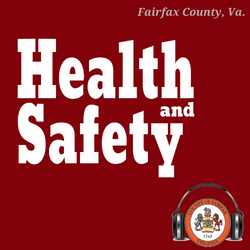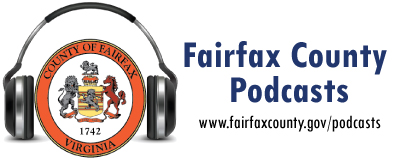April 17, 2024
Hello, and welcome to the Fairfax County Health and Safety Podcast. Coming up, learn what to do if you have to call 9-1-1, what to do if you see young wildlife that appear to be orphaned or abandoned, and the early prediction for the 2024 Atlantic hurricane season. Links to topics mentioned in this podcast can be found online at www.fairfaxcounty.gov.
If you ever find yourself in an emergency situation and need to call 9-1-1, being prepared can help ensure a smooth and efficient response. Here are some tips:
- Stay Calm. Take a deep breath and provide the information requested by the telecommunicator clearly and concisely.
- Know Your Location. Be prepared to provide your exact address or location, including any relevant landmarks or cross streets.
- Describe the Situation. Explain the nature of the emergency, whether it involves a fire, medical issue, crime or any other incident that requires immediate assistance.
- Answer All Questions. The telecommunicator may ask additional questions to gather more details, so answer them as accurately as possible.
- Follow Instructions. Listen carefully to any instructions provided by the telecommunicator, such as steps for first aid or safety measures to take until help arrives.
- Stay on the Line. Do not hang up until the telecommunicator advises you to do so, as they may need additional information or provide further guidance.
Finally, be sure to stay informed about emergencies with our emergency blog, fairfaxcounty.gov/emergency/blog. And sign up for emergency alerts, including alerts and notifications about severe weather, on Fairfax Alerts. Sign up at fairfaxcounty.gov/alerts.
Springtime is here, and with the warming temperatures, we see a boom in baby wildlife. Our Animal Protection Police Officers and Wildlife Management office receive many calls this time of year from residents who are seeking help for young wildlife that appear to be orphaned or abandoned. While these actions are well-intended, it is important to realize intervention may be unnecessary and can be detrimental to wildlife. Many baby animals that are brought to wildlife professionals are in no need of help from humans. Baby animals left alone are not necessarily orphaned or abandoned; many species of wildlife will hide their young for safety, leaving them alone for extended periods of time. Common wildlife frequently found and “rescued” in Fairfax County include squirrels, red foxes, raccoons, rabbits, skunks, opossums, and songbirds. If you come across a baby animal and are wondering whether to intervene, we offer guidelines to determine if the animal needs help. Do not attempt to treat or raise wildlife yourself. Please do not handle any baby wild animal and do not attempt to offer food or water unless instructed to do so by a professional. Many young animals require special diets and inappropriate food or feeding technique can lead to sickness or death. Wild animals can also cause injury or carry parasites and disease, even at a young age. Human handling may cause unnecessary stress or result in trauma to the animal and could increase the risk of disease exposure to humans. Please never touch a wild mammal barehanded; picking up a young animal without gloves increases the risk for possible rabies exposure. As a safety measure and for the welfare of the animal, contact a professional before intervening. This could make a difference in the animal’s life! If an animal is displaying these signs, contact a licensed wildlife rehabilitator, veterinarian, or our Animal Protection Police for further assistance and instruction. Get more tips and information on our police blog, fcpdnews.wordpress.com.
Researchers at Colorado State University are forecasting an extremely active 2024 Atlantic hurricane season, which starts June 1 and lasts until Nov. 30. According to their report released in early April, they anticipate 23 named storms, 11 hurricanes and five major hurricanes (Category 3 or higher on the Saffir-Simpson scale). These numbers are well above the 1991-2020 averages of 14 named storms, seven hurricanes and three major hurricanes. The CSU team cites record warm sea surface temperatures in the tropical and eastern subtropical Atlantic as a primary factor contributing to their prediction of a hyperactive season. Another key factor is the anticipated transition from the current El Niño conditions to a La Niña pattern by the peak of the Atlantic hurricane season (August-October). La Niña typically decreases upper-level westerly winds across the Caribbean and tropical Atlantic, reducing vertical wind shear and favoring hurricane formation and intensification. The CSU team emphasizes that their April forecast has a higher-than-normal confidence level, given the robust signals from their primary predictors. However, they caution that the April outlook historically has the lowest level of skill, and conditions can change between April and the peak of the season. Learn more, including hurricane preparedness tips, on the emergency information blog; fairfaxcounty.gov/emergency/blog.
Finally, each month our Department of Emergency Management and Security produces the “Emergency Preparedness” newsletter and hosts a monthly emergency preparedness webinar. Learn more and sign up for free at www.fairfaxcounty.gov/emergencymanagement.
That’s it for this edition of the Fairfax County Health and Safety Podcast, produced by the Fairfax County, Va., Government. Thanks for listening. Additional information about health and safety topics and emergency preparedness may be found online at www.fairfaxcounty.gov. And remember, if you have a police, fire or medical emergency, call 9-1-1. For non-emergency needs, call 703-691-2131.



 Listen Online or On the Go.
Listen Online or On the Go.